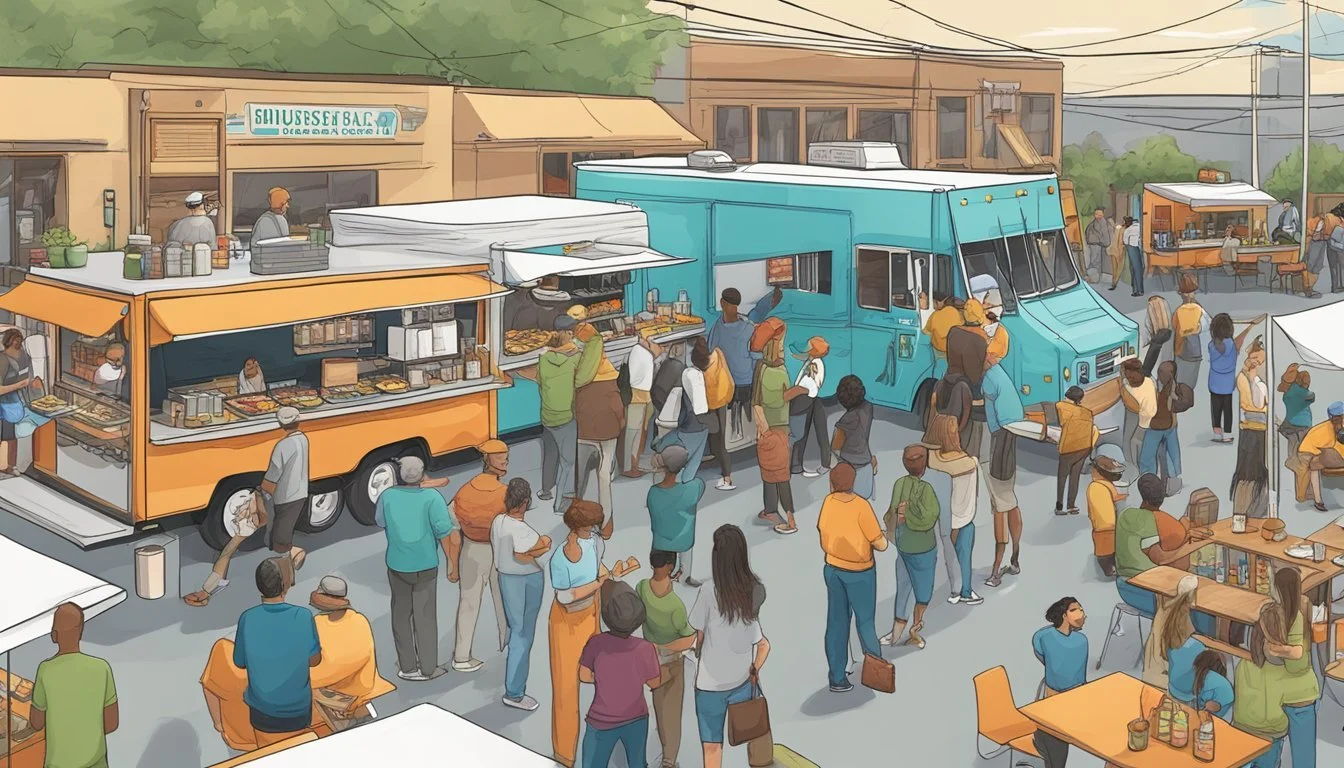Food Truck Laws Albuquerque, New Mexico
Navigating Regulations for Mobile Food Vendors
The bustling streets of Albuquerque, New Mexico, offer a diverse tapestry of food options, with food trucks playing a central role in the city's culinary scene. Understanding the legal landscape for these mobile food enterprises is critical for both seasoned vendors and aspiring entrepreneurs. Navigating the framework of permits and regulations is necessary to operate a food truck in Albuquerque, where compliance with health, safety, and business guidelines is taken seriously.
Starting a food truck business in Albuquerque involves multiple steps, each designed to ensure food safety and public health. To legally serve the community, proprietors must obtain a New Mexico Combined Reporting System (CRS) number, a necessary element of the tax structure. Additionally, the New Mexico Environment Department mandates that food service establishments, including mobile units, adhere to specific food safety practices and may require personnel to have food handler cards.
The city of Albuquerque requires mobile food vendors to have a thorough understanding of food safety guidelines, including the development of Hazard Analysis and Critical Control Points (HACCP) plans for certain food types. For those seeking more in-depth information or assistance with the intricate process of securing a food truck permit, there are resources that provide professional guidance. These regulations ensure that food trucks in Albuquerque not only contribute to the vibrant street food culture but also uphold the health and well-being of the community they serve.
Starting Your Food Truck Business in Albuquerque
Entrepreneurs in Albuquerque interested in the food truck industry need to navigate a series of legal and practical steps. First, they should craft a comprehensive business plan that outlines their concept, market analysis, and financial projections. Specifying whether the business will operate as an LLC or a sole proprietorship is essential—it can affect future liabilities and taxes.
In Albuquerque, food trucks are considered a mobile food business, which requires a range of permits and licenses. Prospective owners must procure a New Mexico Combined Reporting System (CRS) number and a City of Albuquerque business registration. The type of business entity selected, whether it's an LLC or a sole proprietorship, will inform this part of the process.
The required permits and licenses include:
Health permits: To ensure public safety and food handling standards.
Fire inspection certification: A compulsory safety check by the Fire Marshal.
Health Permit: Agency Contact - Albuquerque Environmental Health Department (505-768-2638)
Fire Inspection: Agency Contact - Albuquerque Fire Marshal (505-764-6300)
Building a solid team is crucial for operational success. Employees should be aware of food safety regulations and customer service standards. The food truck culture in Albuquerque is vibrant, making teamwork and a standout concept keys to success. By adhering to these guidelines, ambitious food truck owners can set the wheels of their business in motion toward a flourishing endeavor in Albuquerque's food scene.
Legal Requirements for Food Trucks
Operating a food truck in Albuquerque requires understanding and adhering to various legal requirements. From permits to health regulations, compliance is mandatory for success.
Obtaining Necessary Permits and Licenses
Food truck operators must secure multiple permits and licenses to comply with city and state laws. The first is the Mobile Food Facility Permit, which allows the operation of food services on wheels. In addition to this, a Seller's Permit is necessary for sales tax purposes. Trucks that plan to serve alcohol will require a Liquor License. Every food truck should register for an Employer Identification Number (EIN), which is essential for tax administration. Lastly, business registration is a fundamental legal step to establish the food truck's operation within New Mexico.
Understanding Albuquerque's Health Code Regulations
Compliance with Albuquerque's health code regulations is non-negotiable for food truck operators. Key components of these regulations include regular inspections to ensure food safety standards are upheld. Health permits, which can be obtained after meeting the health code regulations, represent a commitment to maintaining public health. Operators should meet all food safety requirements, which cover the proper handling, storage, and preparation of food.
Albuquerque's Environmental Health Policies
The Environmental Health Department in Albuquerque is focused on the well-being of the community and the environment. This department sets forth policies that food trucks must follow to minimize their environmental impact. Food trucks are subject to environmental health policies which include waste disposal regulations and the usage of sustainable materials. Strict adherence to these policies is crucial, as any violations can lead to penalties, or in severe cases, the revocation of permits.
Compliance with these legalities not only ensures the food trucks operate within the law but also safeguards the community's health and the environment.
Food Truck Operations
Operating a food truck in Albuquerque requires meticulous planning and adherence to food safety regulations. Owners must ensure that their menu planning aligns with sourcing high-quality ingredients, and that food preparation meets the city's health standards.
Menu Planning and Ingredient Sourcing
When planning a menu, food truck operators must consider the availability and quality of ingredients. Prepackaged foods often have specific storage requirements and should be sourced from reputable suppliers to ensure safety. Fresh meats, fish, and dairy products demand rigorous handling to prevent contamination. It's crucial for food trucks to establish trustworthy relationships with suppliers who provide fresh, local produce, including sprouts, vegetables, and fruits. Operators should focus on selecting ingredients that allow for a diverse menu while still satisfying food safety requisites.
Food Preparation and Safety Standards
Food safety is paramount in food truck operations. All food handlers must undergo proper food safety training as mandated by the New Mexico Environment Department. They must be trained in the proper cooking of meats, fish, and dairy products to prevent foodborne illnesses. Strict protocols for the handling and preparation of food, particularly concerning temperature control and cross-contamination, are enforced. Regular inspections ensure that food trucks meet health codes, and adherence to these regulations is non-negotiable for continued operation. It is imperative for all staff to understand and implement these standards consistently to maintain the safety and quality of the food served.
Marketing and Customer Engagement
Effective marketing for food trucks in Albuquerque extends beyond serving great food; it's a critical component for attracting customers and creating a loyal following.
Advertising and Branding Your Mobile Food Business
A strong brand identity is vital for a food truck's visibility and can be achieved through various media outlets. Consistent use of logos and colors on all advertising materials, from social media to flyers, helps establish brand recognition. For local impact, food truck operators should consider leveraging city-specific publications or Albuquerque event listings. Eye-catching signage with the food truck's name and phone number prominently displayed can attract pedestrians and drivers alike, transforming the food truck itself into a mobile advertisement.
Building Customer Relationships
Customer engagement does not end with the sale. Successful food trucks in Albuquerque often foster relationships through personalized service and community involvement. Offering a loyalty program or hosting events at known addresses can encourage repeat visits. Food truck operators should actively maintain an updated phone number and address on their marketing materials and online platforms, facilitating easy access for returning customers. Additionally, incorporating customer feedback and showcasing testimonials can enhance trust and promote word-of-mouth referrals.
Financial Aspects of Food Truck Management
In managing a food truck in Albuquerque, New Mexico, financial stability hinges on two pivotal areas: mitigating risks through proper insurance and optimizing cost against revenue to maximize profitability.
Insurance and Risk Management
Managing a food truck requires navigating various risks, and appropriate insurance policies are critical for protection. Operators should seek an accurate insurance quote to cover liabilities related to property damage, vehicular accidents, foodborne illness outbreaks, and employee-related risks. The right policy not only safeguards against unforeseen events but also ensures compliance with local regulations.
General Liability Insurance: Protects against customer injury or property damage claims.
Commercial Auto Insurance: Covers the food truck itself in case of accidents on the road.
Worker's Compensation: Mandatory if the food truck has employees, covering workplace-related injuries.
Investing in a robust insurance plan is not merely a legal formality; it is a strategic move to shield the business from potential financial setbacks.
Cost Analysis and Revenue Optimization
A detailed cost analysis is imperative for a food truck's financial health. Operators must carefully audit expenses against each revenue stream to identify cost-saving measures and boost net earnings. Key expenses include:
Initial setup costs: Including the purchase or lease of the food truck.
Ongoing operating costs: Such as fuel, maintenance, inventory, and staffing.
Permit and licensing fees: Required by the city of Albuquerque.
Revenue optimization strategies should involve menu pricing, event selection (like festivals or private catering), and location planning to target high-footfall areas. Here, data-driven decisions can make the difference between mere survival and robust profitability. Regular "test" promotions and menu items can help fine-tune offerings to customer preferences, adding a tactical edge to revenue generation.
Fixed Costs: Truck lease, insurance premiums, permits
Variable Costs: Ingredients, packaging, fuel
One-off Costs: Health certification, equipment purchases
By meticulously balancing expense control with revenue-generating activities, food truck operators can establish a sustainable business model.
Additional Considerations for Food Truck Owners
When operating a food truck in Albuquerque, aside from the basic permits and licensing, there are specific regulations regarding home-based food businesses and the management of perishable and non-perishable items. Understanding these nuances is essential to stay compliant and safeguard public health.
Home-Based Food Businesses and Regulations
In Albuquerque, food truck operators may consider supplementing their offerings with products such as cakes, cookies, jellies, and salsa made under the New Mexico Homemade Food Act. This act allows for the sale of certain home-prepared foods that do not require refrigeration to ensure safety. However, they must be produced in a private farm or residence's premises that passes periodic inspections and complies with local zoning regulations.
Managing Refrigeration and Non-Perishables
Food trucks dealing with perishable goods like poultry must have adequate refrigeration systems to maintain food safety. It's critical to:
Regularly monitor and record temperatures
Ensure that the unit is functioning during transit and operations
Separate foods to avoid cross-contamination
For non-perishable items, proper storage is essential to prevent spoilage and pest infestation. Stock rotation using a first-in, first-out (FIFO) system will keep food supplies fresh and reduce waste.
Networking and Industry Insight
For entrepreneurs entering the Albuquerque food truck scene, networking is essential for success. They can connect with others in the industry and gain valuable insights into the local market. The city has various venues and events where food truck owners can meet, share experiences, and learn from each other.
Brett Lindenberg is the founder of Food Truck Empire, a prominent platform offering a wealth of resources for current and aspiring food truck owners. It includes informative articles, business plans, and growth strategies pertinent to the food truck industry. Engaging with this platform can vastly increase an entrepreneur's knowledge and likelihood of success.
The Food Truck Empire website also offers a podcast, which is an invaluable resource where listeners can hear accounts from successful food truck entrepreneurs. These podcasts provide real-world insights, trends in the industry, and advice that can be particularly beneficial for those starting or operating in the Albuquerque area.
Here is a brief list of resources offered by Food Truck Empire:
In-depth interviews with industry experts
Business tips and growth strategies
Success stories and case studies
Utilizing these resources effectively can help a food truck owner navigate the complex layers of local regulations and community expectations in Albuquerque. As the industry continues to grow, staying informed and connected through these channels will be a key factor in the enduring success of a food truck business.






